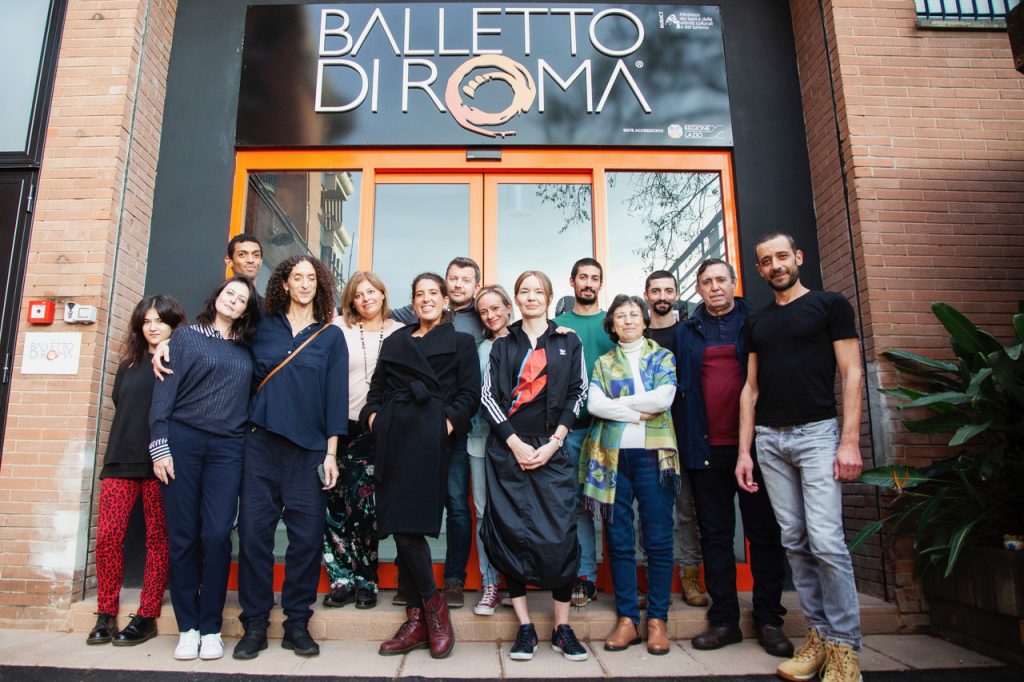
Final Conference
NOVEMBER 29th, 15 pm CET, on Zoom platform (details below) The “UP2DANCE Updating professional...

Peer Learning Workshop 3 in the frame of UP2DANCE project
Peer Learning Workshops – an overview
The Peer Learning Workshops are another important part of the realization of the UP2DANCE project – collaboration between Balletto di Roma (Italy), Derida Dance Center (Bulgaria), Polish Dance Theatre (Poland), ICK Dans Amsterdam (Netherlands), Companhia de Danca de Almada (Portugal) and Magenta Consultoria Projects (Spain), co-funded by the Erasmus+ Program of the European Union.
They are aimed to share innovative/effective methodologies to integrate contemporary languages into the training of trainers and professionals involved in the dance industry, so as to enhance their perspectives and increase their employability, thus being absolutely functional to the achievement of SO3 (To strengthen cooperation and the exchange of good practices among partner organizations concerning vocational training in the field of contemporary dance).
These Peer Learning Workshops are being organized by dance companies and are aimed to facilitate the exchange of good practices among partners, leading to the production of a Manual of Good practices which is one of the tangible results of the project.
Peer Learning Workshop 3 – New management models to be addressed when running contemporary dance
Peer Learning Workshop 3 will be hosted by Derida Dance Center via Skype due to travel restrictions between 22nd and 26th of March 2021. Each training day will take place in the morning and attended by two representatives of each partnering organization. It will last 3 hours – from 09:30 (CET) until 12:30 (CET). 24th of March would be organized as a reflection day for 1:1 call to solve possible doubts.
Given the specific objective of this workshop, mainly addressed to organizational and management change inside the dance organizations, it will be mainly attended by managing staff and connecting figures between management and artistic staff.
Day one of the workshop would start with a short presentation led by Atanas Maev – CEO of Derida Dance Center and will include overall information about the forthcoming days of the workshop, main organizational, management aspects and good practices leading to new management models required when working on contemporary dance languages. Representatives of each partner organization would be given the chance to present their own organization in terms of organizational, management aspects and good practices leading to new management models required when working on contemporary dance languages. The day will end with a discussion between the participants regarding the similarities and differences in the method of work of their organizations and what they stem from – geopolitical, historical, demographic factors. The partners will brainstorm about how they could implement the initially shared good practices in the work of their organizations and how this would affect both nationally and internationally in the field of contemporary dance.
Day 2 would start with a definition of specific management aspects addressed by transition to contemporary dance – staff recruitment (artistic and technical), artistic production (activities schedule and timing); marketing and communication (towards new public, but also keeping the old one). All partners would share their own experience by sharing success cases and good practices from their own work or experience, and concluding their presentation with needs and bottlenecks.
Day 3 would be a reflection day aimed at conducting one to one conversations between partners and Derida Dance Center considering unclear topics and further questions.
Day 4 of the workshop is planned to be a video chat with guest speakers working in the field that would share relevant good practices. The invited professionals are Katherina Vasiliadis, who has vast experience in the field of cultural management and the international relations for independent choreographers as well as organizations, Anna Arthur (administrative director of “Aerowaves – dance across Europe”) and Kirsten Seeligmueller (co-founder of DOCK11). The day will end with a shared definition of the management models partners will introduce in the final output: Manual of good practices.
The last day of the workshop will include observation/participation in dance class led by Jivko Jeliazkov, Artistic Director of Derida Dance Center and will end with conclusions and evaluation.
Background
The transition from classic to contemporary dance not only affects the different aspects related to artistic gesture and codification of languages; it affects the whole chain of a dance training and performance production inside dance companies, from an organizational and management perspective.
Contemporary production requires an overall new approach towards production: the consequentiality of production steps traditionally foreseen in classical dance is often non-respected; several figures and professionals required in classical production may be incorporated in only one professional in contemporary dance, while new professionals and technicalities may be required (being, for instance, the use of ICT for set design widely used). At the same time, a new effort has to be done in (re)positioning with old and new audiences, used to classical language and performances; dance schools addressing the contemporary need to carefully design an audience strategy, able to involve new potential audiences without losing the old, more traditional, ones.
Given all the aspects underlined, organizations willing to introduce contemporary dance in their production need to re-think their management models, in terms of positioning, management, production procedures and timing.
The third Peer Learning Workshop will thus have the main aim of enhancing participants’ reflection on new management models required when working on contemporary dance languages. Main needs, bottlenecks and possible solutions will be shared, and the final conclusion will be used in the design of the Manual of good practices